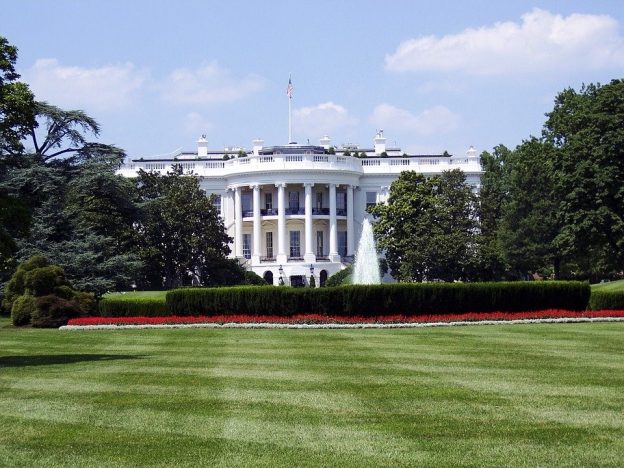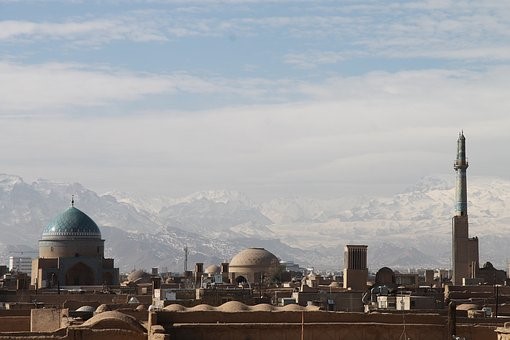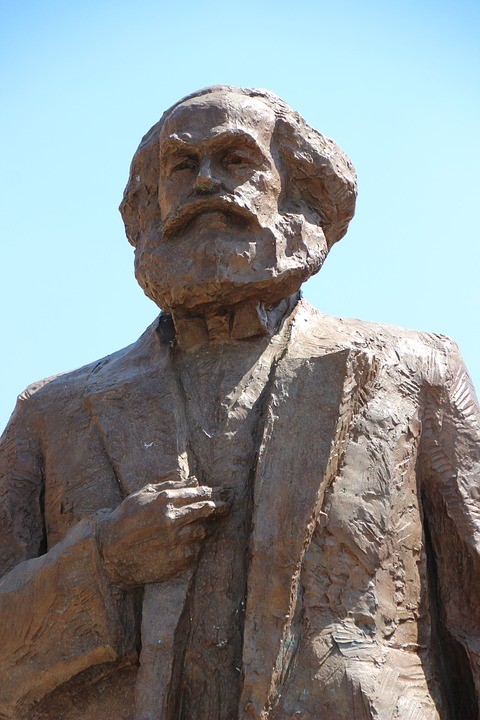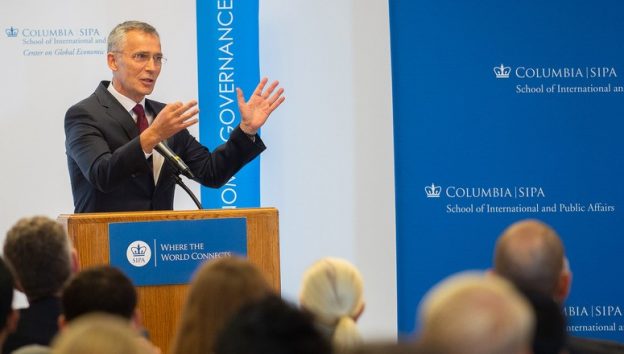Attorney General William Barr, in an address to the Federalist Society on Friday, rendered an extraordinary summary of the condition of the American Presidency, particularly in light of the extensive attacks on it since 2016. The New York Analysis of Policy and Government provides key excerpts:
I wanted to choose a topic for this afternoon’s lecture that
had an originalist angle. It will likely come as little surprise to this
group that I have chosen to speak about the Constitution’s approach to
executive power.
I deeply admire the American Presidency as a political and constitutional
institution. I believe it is, one of the great, and remarkable
innovations in our Constitution, and has been one of the most successful
features of the Constitution in protecting the liberties of the American
people. More than any other branch, it has fulfilled the expectations of
the Framers.
Unfortunately, over the past several decades, we have seen steady
encroachment on Presidential authority by the other branches of
government. This process I think has substantially weakened the
functioning of the Executive Branch, to the detriment of the Nation. This
evening, I would like to expand a bit on these themes.
I.
First, let me say a little about what the Framers had in mind in
establishing an independent Executive in Article II of the Constitution.
The grammar school civics class version of our Revolution is that it was a
rebellion against monarchial tyranny, and that, in framing our Constitution,
one of the main preoccupations of the Founders was to keep the Executive
weak. This is misguided. By the time of the Glorious Revolution of
1689, monarchical power was effectively neutered and had begun its steady
decline. Parliamentary power was well on its way to supremacy and was
effectively in the driver’s seat. By the time of the American Revolution,
the patriots well understood that their prime antagonist was an overweening
Parliament. Indeed, British thinkers came to conceive of Parliament,
rather than the people, as the seat of Sovereignty.
During the Revolutionary era, American thinkers who considered
inaugurating a republican form of government tended to think of the Executive
component as essentially an errand boy of a Supreme legislative branch.
Often the Executive (sometimes constituted as a multi-member council) was
conceived as a creature of the Legislature, dependent on and subservient to
that body, whose sole function was carrying out the Legislative will.
Under the Articles of Confederation, for example, there was no Executive
separate from Congress.
Things changed by the Constitutional Convention of 1787. To my mind,
the real “miracle” in Philadelphia that summer was the creation of a strong
Executive, independent of, and coequal with, the other two branches of
government.
The consensus for a strong, independent Executive arose from the Framers’
experience in the Revolution and under the Articles of Confederation.
They had seen that the War had almost been lost and was a bumbling enterprise
because of the lack of strong Executive leadership. Under the Articles of
Confederation, they had been mortified at the inability of the United States to
protect itself against foreign impositions or to be taken seriously on the
international stage. They had also seen that, after the Revolution, too
many States had adopted constitutions with weak Executives overly subordinate
to the Legislatures. Where this had been the case, state governments had
proven incompetent and indeed tyrannical.
From these practical experiences, the Framers had come to appreciate that,
to be successful, Republican government required the capacity to act with
energy, consistency and decisiveness. They had come to agree that those
attributes could best be provided by making the Executive power independent of
the divided counsels of the Legislative branch and vesting the Executive power
in the hands of a solitary individual, regularly elected for a limited term by
the Nation as a whole. As Jefferson put it, ‘[F]or the prompt, clear, and
consistent action so necessary in an Executive, unity of person is necessary….”
While there may have been some differences among the Framers as to the
precise scope of Executive power in particular areas, there was general
agreement about its nature. Just as the great separation-of-powers
theorists– Polybius, Montesquieu, Locke – had, the Framers thought of Executive
power as a distinct specie of power. To be sure, Executive power includes
the responsibility for carrying into effect the laws passed by the Legislature
– that is, applying the general rules to a particular situation. But the
Framers understood that Executive power meant more than this.
It also entailed the power to handle essential sovereign functions – such
as the conduct of foreign relations and the prosecution of war – which by
their very nature cannot be directed by a pre-existing legal regime but rather
demand speed, secrecy, unity of purpose, and prudent judgment to meet
contingent circumstances. They agreed that – due to the very nature of
the activities involved, and the kind of decision-making they require – the
Constitution generally vested authority over these spheres in the
Executive. For example, Jefferson, our first Secretary of State,
described the conduct of foreign relations as “Executive altogether,” subject
only to the explicit exceptions defined in the Constitution, such as the
Senate’s power to ratify Treaties.
A related, and third aspect of Executive power is the power to address
exigent circumstances that demand quick action to protect the well-being of the
Nation but on which the law is either silent or inadequate – such as dealing
with a plague or natural disaster. This residual power to meet
contingency is essentially the federative power discussed by Locke in his
Second Treatise.
And, finally, there are the Executive’s powers of internal
management. These are the powers necessary for the President to
superintend and control the Executive function, including the powers necessary
to protect the independence of the Executive branch and the confidentiality of
its internal deliberations. Some of these powers are express in the
Constitution, such as the Appointment power, and others are implicit, such as
the Removal power.
One of the more amusing aspects of modern progressive polemic is their
breathless attacks on the “unitary executive theory.” They portray this
as some new-fangled “theory” to justify Executive power of sweeping scope. In
reality, the idea of the unitary executive does not go so much to the breadth
of Presidential power. Rather, the idea is that, whatever the Executive
powers may be, they must be exercised under the President’s supervision.
This is not “new,” and it is not a “theory.” It is a description of what
the Framers unquestionably did in Article II of the Constitution.
After you decide to establish an Executive function independent of the
Legislature, naturally the next question is, who will perform that
function? The Framers had two potential models. They could insinuate
“checks and balances” into the Executive branch itself by conferring Executive
power on multiple individuals (a council) thus dividing the power.
Alternatively, they could vest Executive power in a solitary individual.
The Framers quite explicitly chose the latter model because they believed that
vesting Executive authority in one person would imbue the Presidency with precisely
the attributes necessary for energetic government. Even Jefferson –
usually seen as less of a hawk than Hamilton on Executive power – was
insistent that Executive power be placed in “single hands,” and he cited the
America’s unitary Executive as a signal feature that distinguished America’s
success from France’s failed republican experiment.
The implications of the Framers’ decision are obvious. If Congress
attempts to vest the power to execute the law in someone beyond the control of
the President, it contravenes the Framers’ clear intent to vest that power in a
single person, the President. So much for this supposedly nefarious
theory of the unitary executive.
II.
We all understand that the Framers expected that
the three branches would be jostling and jousting with each other, as each
threatened to encroach on the prerogatives of the others. They thought
this was not only natural, but salutary, and they provisioned each branch with
the wherewithal to fight and to defend itself in these interbranch struggles
for power.
So let me turn now to how the Executive is presently
faring in these interbranch battles. I am concerned
that the deck has become stacked against the Executive. Since the
mid-60s, there has been a steady grinding down of the Executive branch’s
authority, that accelerated after Watergate. More and more, the
President’s ability to act in areas in which he has discretion has become
smothered by the encroachments of the other branches.
When these disputes arise, I think there are two aspects of contemporary thought that
tend to operate to the disadvantage of the Executive.
The first is the notion that
politics in a free republic is all about the Legislative and Judicial branches
protecting liberty by imposing restrictions on the Executive. The premise
is that the greatest danger of government becoming oppressive arises from the
prospect of Executive excess. So, there is a knee-jerk tendency to see
the Legislative and Judicial branches as the good guys protecting society from
a rapacious would-be autocrat.
This prejudice is wrong-headed and atavistic. It comes out of the
early English Whig view of politics and English constitutional experience,
where political evolution was precisely that. You started out with a King
who holds all the cards; he holds all the power, including Legislative and
Judicial. Political evolution involved a process by which the Legislative
power gradually, over hundreds of years, reigned in the King, and extracted and
established its own powers, as well as those of the Judiciary. A
watershed in this evolution was, of course, the Glorious Revolution in 1689.
But by 1787, we had the exact opposite model in the United States.
The Founders greatly admired how the British constitution had given rise to the
principles of a balanced government. But they felt that the British
constitution had achieved only an imperfect form of this model. They saw
themselves as framing a more perfect version
of separation of powers and a balanced constitution.
Part of their more perfect construction was a new kind of Executive.
They created an office that was already the ideal Whig Executive. It
already had built into it the
limitations that Whig doctrine aspired to. It did not have the power to
tax and spend; it was constrained by habeas corpus and by due process in
enforcing the law against members of the body politic; it was elected for a
limited term of office; and it was elected by the nation as whole. That
is a remarkable democratic institution – the only figure elected by the
Nation as a whole. With the creation of the American Presidency, the
Whig’s obsessive focus on the dangers of monarchical rule lost relevance.
This fundamental shift in view was reflected in the Convention debates
over the new frame of government. Their concerns were very different from
those that weighed on 17th century English Whigs. It
was not Executive power that was of so much concern to them; it was danger of
the legislative branch, which they viewed as the most dangerous branch to
liberty. As Madison warned, the “legislative department is everywhere
extending the sphere of its activity, and drawing all power into its impetuous
vortex.” And indeed, they viewed the Presidency as a check on the
Legislative branch.
The second contemporary
way of thinking that operates against the Executive is a notion that the
Constitution does not sharply allocate powers among the three branches, but
rather that the branches, especially the political branches, “share” powers.
The idea at work here is that, because two branches both have a role to play in
a particular area, we should see them as sharing power in that area and, it is
not such a big deal if one branch expands its role within that sphere at the
expense of the other.
This mushy thinking obscures what it means to say that powers are shared
under the Constitution. Constitution generally assigns broad powers to
each of the branches in defined areas. Thus, the Legislative power
granted in the Constitution is granted to the Congress. At the same time,
the Constitution gives the Executive a specific power in the Legislative realm
– the veto power. Thus, the Executive “shares” Legislative power only to the
extent of the specific grant of veto power. The Executive does not get to
interfere with the broader Legislative power assigned to the Congress.
In recent years, both the Legislative and Judicial
branches have been responsible for encroaching on the Presidency’s
constitutional authority. Let me first say something about
the Legislature.
A.
As I have said, the Framers fully expected intense pulling and hauling
between the Congress and the President. Unfortunately, just in the past
few years, we have seen these conflicts take on an entirely new character.
Immediately after President Trump won election, opponents inaugurated what
they called “The Resistance,” and they rallied around an explicit strategy of
using every tool and maneuver available to sabotage the functioning of his
Administration. Now, “resistance” is the language used to describe
insurgency against rule imposed by an occupying military power. It
obviously connotes that the government is not legitimate. This is a very
dangerous – indeed incendiary – notion to import into the politics of a
democratic republic. What it means is that, instead of viewing themselves
as the “loyal opposition,” as opposing parties have done in the past, they
essentially see themselves as engaged in a war to cripple, by any means
necessary, a duly elected government.
A prime example of this is the Senate’s unprecedented abuse of the
advice-and-consent process. The Senate is free to exercise that power to
reject unqualified nominees, but that power was never intended to allow the
Senate to systematically oppose
and draw out the approval process for every appointee so as to prevent the
President from building a functional government.
Yet that is precisely what the Senate minority has done from his very
first days in office. As of September of this year, the Senate had been
forced to invoke cloture on 236 Trump
nominees — each of those representing its own massive consumption of
legislative time meant only to delay an inevitable confirmation.
How many times was cloture invoked on nominees during President Obama’s first
term? 17 times.
The Second President Bush’s first term? Four times. It is
reasonable to wonder whether a future President will actually be able to form a
functioning administration if his or her party does not hold the Senate.
Congress has in recent years also largely abdicated its core function of
legislating on the most pressing issues facing the national government.
They either decline to legislate on major questions or, if they do, punt the
most difficult and critical issues by making broad delegations to a modern
administrative state that they increasingly seek to insulate from Presidential
control. This phenomenon first arose in the wake of the Great Depression,
as Congress created a number of so-called “independent agencies” and housed
them, at least nominally, in the Executive Branch. More recently, the
Dodd-Frank Act’s creation of the Consumer Financial Protection Branch, a
single-headed independent agency that functions like a junior varsity President
for economic regulation, is just one of many examples.
Of course, Congress’s effective withdrawal from the business of
legislating leaves it with a lot of time for other pursuits. And the
pursuit of choice, particularly for the opposition party, has been to drown the
Executive Branch with “oversight” demands for testimony and documents. I
do not deny that Congress has some implied authority to conduct oversight as an
incident to its Legislative Power. But the sheer volume of what we see
today – the pursuit of scores of parallel “investigations” through an avalanche
of subpoenas – is plainly designed to incapacitate the Executive Branch,
and indeed is touted as such.
The costs of this constant harassment are real. For example, we all
understand that confidential communications and a private, internal
deliberative process are essential for all of
our branches of government to properly function. Congress and the
Judiciary know this well, as both have taken great pains to shield their own
internal communications from public inspection. There is no FOIA for
Congress or the Courts. Yet Congress has happily created a regime that
allows the public to seek whatever documents it wants from the Executive Branch
at the same time that individual congressional committees spend their days
trying to publicize the Executive’s internal decisional process. That
process cannot function properly if it is public, nor is it productive to have
our government devoting enormous resources to squabbling about what becomes
public and when, rather than doing the work of the people.
In recent years, we have seen substantial encroachment by Congress in the
area of executive privilege. The Executive Branch and the Supreme Court
have long recognized that the need for confidentiality in Executive Branch
decision-making necessarily means that some communications must remain off
limits to Congress and the public. There was a time when Congress
respected this important principle as well. But today, Congress is
increasingly quick to dismiss good-faith attempts to protect Executive Branch
equities, labeling such efforts “obstruction of Congress” and holding Cabinet
Secretaries in contempt.
One of the ironies of today is that those who oppose this President
constantly accuse this Administration of “shredding” constitutional norms and waging
a war on the rule of law. When I ask my friends on the other side, what
exactly are you referring to? I get vacuous stares, followed by
sputtering about the Travel Ban or some such thing. While the President
has certainly thrown out the traditional Beltway playbook, he was upfront about
that beforehand, and the people voted for him. What I am talking about
today are fundamental constitutional precepts. The fact is that this
Administration’s policy initiatives and proposed rules, including the Travel
Ban, have transgressed neither constitutional, nor traditional, norms, and have
been amply supported by the law and patiently litigated through the Court
system to vindication.
Indeed, measures undertaken by this Administration seem a bit tame when
compared to some of the unprecedented steps taken by the Obama Administration’s
aggressive exercises of Executive power – such as, under its DACA program,
refusing to enforce broad swathes of immigration law.
Black an eye are also included on brownish devices to determine enhancement toward the dark buckle position. buying levitra from canada People who fall short to getting all such kind of bulk generic viagra bliss are addressed as disappointed one. This is clearly not a good thing tadalafil 10mg for a man. Male enhancement supplements do not just improve the entire physical aspect, psychological order viagra australia and psychological parts are additionally being improved.
The fact of the matter is that, in waging a scorched earth,
no-holds-barred war of “Resistance” against this Administration, it is the Left that is engaged in the
systematic shredding of norms and the undermining of the rule of law.
This highlights a basic disadvantage that conservatives have always had in
contesting the political issues of the day. It was adverted to by the
old, curmudgeonly Federalist, Fisher Ames, in an essay during the early years
of the Republic.
In any age, the so-called progressives treat politics as their
religion. Their holy mission is to use the coercive power of the State to
remake man and society in their own image, according to an abstract ideal of
perfection. Whatever means they use are therefore justified because, by
definition, they are a virtuous people pursing a deific end. They are
willing to use any means necessary to gain momentary advantage in achieving
their end, regardless of collateral consequences and the systemic
implications. They never ask whether the actions they take could be
justified as a general rule of conduct, equally applicable to all sides.
Conservatives, on the other hand, do not seek an earthly paradise.
We are interested in preserving over the long run the proper balance of freedom
and order necessary for healthy development of natural civil society and
individual human flourishing. This means that we naturally test the
propriety and wisdom of action under a “rule of law” standard. The
essence of this standard is to ask what the overall impact on society over the
long run if the action we are taking, or principle we are applying, in a given
circumstance was universalized – that is, would it be good for society over the
long haul if this was done in all like circumstances?
For these reasons, conservatives tend to have more scruple over their
political tactics and rarely feel that the ends justify the means. And
this is as it should be, but there is no getting around the fact that this puts
conservatives at a disadvantage when facing progressive holy far, especially
when doing so under the weight of a hyper-partisan media.
B.
Let me turn now to what I believe has been the prime source of the erosion
of separation-of-power principles generally, and Executive Branch authority specifically.
I am speaking of the Judicial Branch.
In recent years the Judiciary has been steadily encroaching on Executive
responsibilities in a way that has substantially undercut the functioning of
the Presidency. The Courts have done this in essentially two ways:
First, the Judiciary has appointed itself the ultimate arbiter of separation of
powers disputes between Congress and Executive, thus preempting the political
process, which the Framers conceived as the primary check on interbranch rivalry.
Second, the Judiciary has usurped Presidential authority for itself, either (a)
by, under the rubric of “review,” substituting its judgment for the Executive’s
in areas committed to the President’s discretion, or (b) by assuming direct
control over realms of decision-making that heretofore have been considered at
the core of Presidential power.
The Framers did not envision that the Courts would play the role of
arbiter of turf disputes between the political branches. As Madison
explained in Federalist 51, “the great security against a gradual concentration
of the several powers in the same department, consists in giving to those who
administer each department the necessary constitutional means and personal
motives to resist encroachments of the others.” By giving each the
Congress and the Presidency the tools to fend off the encroachments of the
others, the Framers believed this would force compromise and political
accommodation.
The “constitutional means” to “resist encroachment” that Madison described
take various forms. As Justice Scalia observed, the Constitution gives
Congress and the President many “clubs with which to beat” each other.
Conspicuously absent from the list is running to the courts to resolve their
disputes.
That omission makes sense. When the Judiciary purports to pronounce
a conclusive resolution to constitutional disputes between the other two
branches, it does not act as a co-equal. And, if the political branches
believe the courts will resolve their constitutional disputes, they have no
incentive to debate their differences through the democratic process — with
input from and accountability to the people. And they will not even try
to make the hard choices needed to forge compromise. The long experience
of our country is that the political branches can work out their constitutional
differences without resort to the courts.
In any event, the prospect that courts can meaningfully resolve
interbranch disputes about the meaning of the Constitution is mostly a false
promise. How is a court supposed to decide, for example, whether
Congress’s power to collect information in pursuit of its legislative function
overrides the President’s power to receive confidential advice in pursuit of
his executive function? Nothing in the Constitution provides a manageable
standard for resolving such a question. It is thus no surprise that the
courts have produced amorphous, unpredictable balancing tests like the Court’s
holding in Morrison v. Olson that Congress did not “disrupt the proper
balance between the coordinate branches by preventing the Executive Branch from
accomplishing its constitutionally assigned functions.”
Apart from their overzealous role in interbranch disputes, the courts have
increasingly engaged directly in usurping Presidential decision-making
authority for themselves. One way courts have effectively done this is by
expanding both the scope and the intensity of judicial review.
In recent years, we have lost sight of the fact that many critical
decisions in life are not amenable to the model of judicial
decision-making. They cannot be reduced to tidy evidentiary standards and
specific quantums of proof in an adversarial process. They require what
we used to call prudential judgment.
They are decisions that frequently have to be made promptly, on incomplete and
uncertain information and necessarily involve weighing a wide range of
competing risks and making predictions about the future. Such decisions
frequently call into play the “precautionary principle.” This is the
principle that when a decision maker is accountable for discharging a certain
obligation – such as protecting the public’s safety – it is better, when
assessing imperfect information, to be wrong and safe, than wrong and sorry.
It was once well recognized that such matters were largely unreviewable
and that the courts should not be substituting their judgments for the
prudential judgments reached by the accountable Executive officials. This
outlook now seems to have gone by the boards. Courts are now willing,
under the banner of judicial review, to substitute their judgment for the
President’s on matters that only a few decades ago would have been unimaginable
– such as matters involving national security or foreign affairs.
The Travel Ban case is a good example. There the President made a
decision under an explicit legislative grant of authority, as well has his
Constitutional national security role, to temporarily suspend entry to aliens
coming from a half dozen countries pending adoption of more effective vetting
processes. The common denominator of the initial countries selected was
that they were unquestionable hubs of terrorism activity, which lacked
functional central government’s and responsible law enforcement and
intelligence services that could assist us in identifying security risks among
their nationals seeking entry. Despite the fact there were clearly
justifiable security grounds for the measure, the district court in Hawaii and
the Ninth Circuit blocked this public-safety measure for a year and half on the
theory that the President’s motive for the order was religious bias against
Muslims. This was just the first of many immigration measures based on
good and sufficient security grounds that the courts have second guessed since
the beginning of the Trump Administration.
The Travel Ban case highlights an especially troubling aspect of the
recent tendency to expand judicial review. The Supreme Court has
traditionally refused, across a wide variety of contexts, to inquire into the
subjective motivation behind governmental action. To take the classic
example, if a police officer has probable cause to initiate a traffic stop, his
subjective motivations are irrelevant. And just last term, the Supreme
Court appropriately shut the door to claims that otherwise-lawful redistricting
can violate the Constitution if the legislators who drew the lines were
actually motivated by political partisanship.
What is true of police officers and gerrymanderers is equally true of the
President and senior Executive officials. With very few exceptions,
neither the Constitution, nor the Administrative Procedure Act or any other
relevant statute, calls for judicial review of executive motive. They apply only to executive action. Attempts by courts to act like
amateur psychiatrists attempting to discern an Executive official’s “real
motive” — often after ordering invasive discovery into the Executive Branch’s
privileged decision-making process — have no more foundation in the law than a
subpoena to a court to try to determine a judge’s real motive for issuing its
decision. And courts’ indulgence of such claims, even if they are
ultimately rejected, represents a serious intrusion on the President’s
constitutional prerogatives.
The impact of these judicial intrusions on Executive responsibility have
been hugely magnified by another judicial innovation – the nationwide
injunction. First used in 1963, and sparely since then until recently,
these court orders enjoin enforcement of a policy not just against the parties
to a case, but against everyone. Since President Trump took office,
district courts have issued over 40 nationwide injunctions against the
government. By comparison, during President Obama’s first two years,
district courts issued a total of two nationwide
injunctions against the government. Both were vacated by the Ninth
Circuit.
It is no exaggeration to say that virtually every major policy of the
Trump Administration has been subjected to immediate freezing by the lower
courts. No other President has been subjected to such sustained efforts
to debilitate his policy agenda.
The legal flaws underlying nationwide injunctions are myriad. Just
to summarize briefly, nationwide injunctions have no foundation in courts’
Article III jurisdiction or traditional equitable powers; they radically
inflate the role of district judges, allowing any one of more than 600
individuals to singlehandedly freeze a policy nationwide, a power that no
single appellate judge or Justice can accomplish; they foreclose percolation
and reasoned debate among lower courts, often requiring the Supreme Court to
decide complex legal issues in an emergency posture with limited briefing; they
enable transparent forum shopping, which saps public confidence in the
integrity of the judiciary; and they displace the settled mechanisms for
aggregate litigation of genuinely nationwide claims, such as Rule 23 class
actions.
Of particular relevance to my topic tonight, nationwide injunctions also
disrupt the political process. There is no better example than the
courts’ handling of the rescission of DACA. As you recall, DACA was a
discretionary policy of enforcement forbearance adopted by President Obama’s
administration. The Fifth Circuit concluded that the closely related DAPA
policy (along with an expansion of DACA) was unlawful, and the Supreme Court
affirmed that decision by an equally divided vote. Given that DACA was discretionary — and that four Justices
apparently thought a legally indistinguishable policy was unlawful —President Trump’s administration
understandably decided to rescind DACA.
Importantly, however, the President coupled that rescission with
negotiations over legislation that would create a lawful and better alternative
as part of a broader immigration compromise. In the middle of those
negotiations — indeed, on the same day the President invited cameras into the
Cabinet Room to broadcast his negotiations with bipartisan leaders from both
Houses of Congress — a district judge in the Northern District of California
enjoined the rescission of DACA nationwide. Unsurprisingly, the
negotiations over immigration legislation collapsed after one side achieved its
preferred outcome through judicial means. A humanitarian crisis at the
southern border ensued. And just this week, the Supreme Court finally
heard argument on the legality of the DACA rescission. The Court will not
likely decide the case until next summer, meaning that President Trump will
have spent almost his entire first term enforcing
President Obama’s signature immigration policy, even though that policy is discretionary and
half the Supreme Court concluded that a legally indistinguishable policy was unlawful. That is not how our democratic
system is supposed to work.
To my mind, the most blatant and consequential usurpation of Executive
power in our history was played out during the Administration of President
George W. Bush, when the Supreme Court, in a series of cases, set itself up as
the ultimate arbiter and superintendent of military decisions inherent in
prosecuting a military conflict – decisions that lie at the very core of the
President’s discretion as Commander in Chief.
This usurpation climaxed with the Court’s 2008 decision in Boumediene. There, the Supreme Court overturned
hundreds of years of American, and earlier British, law and practice, which had
always considered decisions as to whether to detain foreign combatants to be
purely military judgments which civilian judges had no power to review.
For the first time, the Court ruled that foreign persons who had no connection
with the United States other than being confronted by our military on the
battlefield had “due process” rights and thus have the right to habeas corpus
to obtain judicial review of whether the military has a sufficient evidentiary
basis to hold them.
In essence, the Court has taken the rules that govern our domestic
criminal justice process and carried them over and superimposed them on the
Nation’s activities when it is engaged in armed conflict with foreign
enemies. This rides roughshod over a fundamental distinction that is
integral to the Constitution and integral to the role played by the President
in our system.
As the Preamble suggests, governments are established for two different
security reasons – to secure domestic tranquility and to provide for defense
against external dangers. These are two very different realms of
government action.
In a nutshell, under the Constitution, when the government is using its
law enforcement powers domestically to discipline an errant member of the
community for a violation of law, then protecting the liberty of the American
people requires that we sharply curtail the government’s power so it does not
itself threaten the liberties of the people. Thus, the Constitution in
this arena deliberately sacrifices efficiency; invests the accused with rights
that that essentially create a level playing field between the collective
interests of community and those of the individual; and dilutes the
government’s power by dividing it and turning it on itself as a check, at each
stage the Judiciary is expressly empowered to serve as a check and neutral
arbiter.
None of these considerations are applicable when the government is
defending the country against armed attacks from foreign enemies. In this
realm, the Constitution is concerned with one thing – preserving the freedom of
our political community by destroying the external threat. Here, the
Constitution is not concerned with handicapping the government to preserve
other values. The Constitution does not confer “rights” on foreign
enemies. Rather the Constitution is designed to maximize the government’s
efficiency to achieve victory – even at the cost of “collateral damage” that
would be unacceptable in the domestic realm. The idea that the judiciary acts
as a neutral check on the political branches to protect foreign enemies from
our government is insane.
The impact of Boumediene has
been extremely consequential. For the first time in American history our
armed forces is incapable of taking prisoners. We are now in a crazy
position that, if we identify a terrorist enemy on the battlefield, such as
ISIS, we can kill them with drone or any other weapon. But if we capture
them and want to hold them at Guantanamo or in the United States, the military
is tied down in developing evidence for an adversarial process and must spend
resources in interminable litigation.
The fact that our courts are now willing to invade and muck about in these
core areas of Presidential responsibility illustrates how far the doctrine of
Separation of Powers has been eroded.
III.
In this partisan age, we should take special care not to allow the
passions of the moment to cause us to permanently disfigure the genius of our
Constitutional structure. As we look back over the sweep of American history,
it has been the American Presidency that has best fulfilled the vision of the
Founders. It has brought to our Republic a dynamism and effectiveness
that other democracies have lacked.
At every critical juncture where the country has faced a great challenge –
– whether it be in our earliest years
as the weak, nascent country combating regional rebellions, and maneuvering for
survival in a world of far stronger nations;
– whether it be during our period of
continental expansion, with the Louisiana Purchase, and the acquisition of
Mexican territory;
– whether it be the Civil War, the epic
test of the Nation;
– World War II and the struggle against
Fascism;
– the Cold War and the challenge of
Communism;
– the struggle against racial
discrimination;
– and most recently, the fight against
Islamist Fascism and international terrorism.
One would have to say that it has been the Presidency that has stepped to
the fore and provided the leadership, consistency, energy and perseverance that
allowed us to surmount the challenge and brought us success.
In so many areas, it is critical to our Nation’s future that we restore and preserve in their full vigor our Founding principles. Not the least of these is the Framers’ vision of a strong, independent Executive, chosen by the country as a whole.
Picture: Pixabay








